Reflective Accounts: Theatre Scrub Nurse - Code of Conduct Application
VerifiedAdded on 2020/03/02
|6
|1428
|574
Journal and Reflective Writing
AI Summary
This document presents a series of reflective accounts from a theatre scrub nurse, detailing experiences across several key areas of practice. The accounts cover incidents related to safeguarding children, infection prevention and control, manual handling, safeguarding adults, and violation and aggression. Each reflection includes a description of the event, lessons learned, changes made in practice, and the relevance to the professional code of conduct. The narratives highlight the challenges and complexities of working in a fast-paced operating room environment, emphasizing the importance of patient safety, adherence to protocols, and professional conduct. The author discusses the emotional impact of difficult cases, the need for continuous learning, and the strategies adopted to improve practice, such as delegation, psychological preparation, and consultation with colleagues. The reflections also touch upon the importance of self-awareness, risk management, and the handling of difficult situations, such as verbal abuse from superiors. The document serves as a valuable resource for healthcare professionals seeking to enhance their reflective practice and improve patient care.
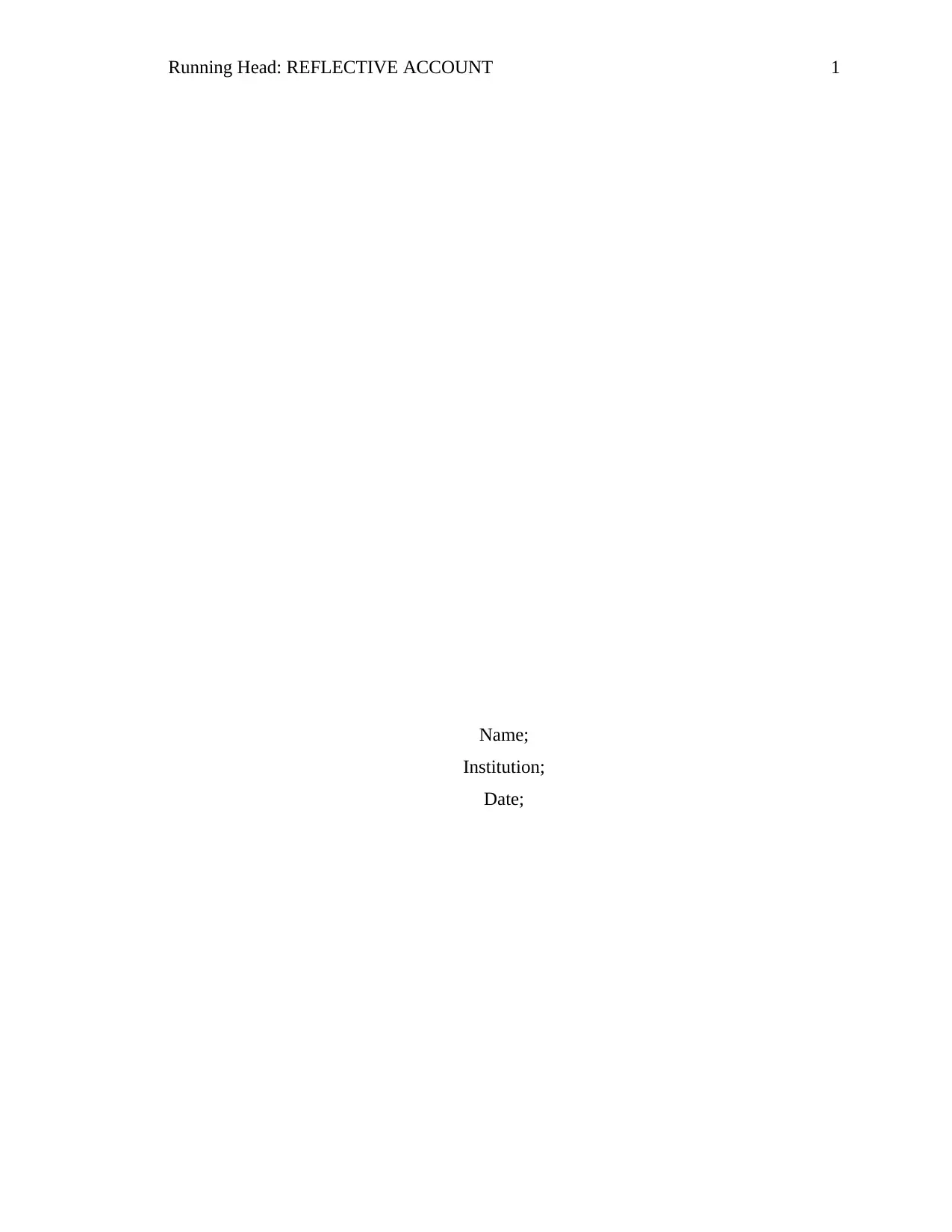
Running Head: REFLECTIVE ACCOUNT 1
Name;
Institution;
Date;
Name;
Institution;
Date;
Paraphrase This Document
Need a fresh take? Get an instant paraphrase of this document with our AI Paraphraser
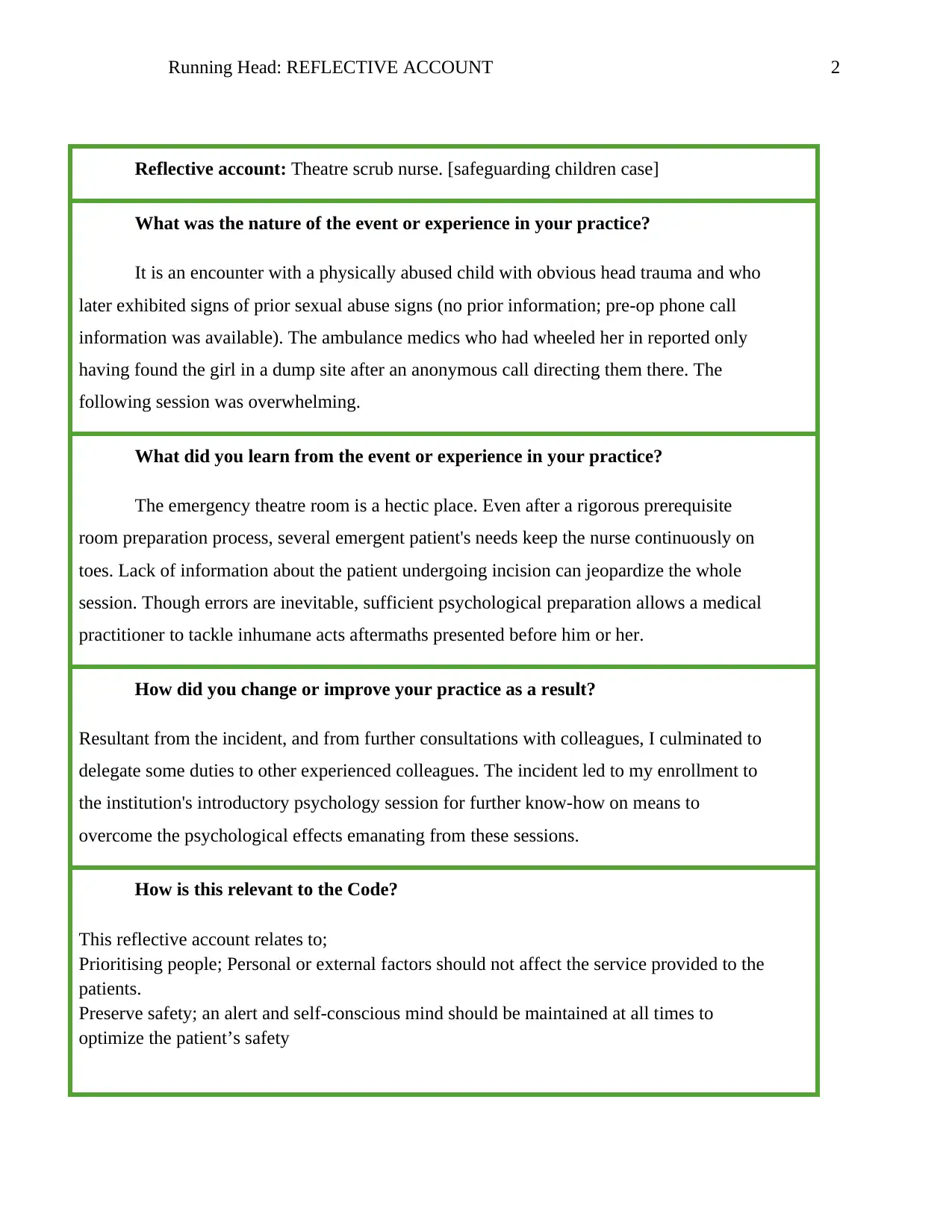
Running Head: REFLECTIVE ACCOUNT 2
Reflective account: Theatre scrub nurse. [safeguarding children case]
What was the nature of the event or experience in your practice?
It is an encounter with a physically abused child with obvious head trauma and who
later exhibited signs of prior sexual abuse signs (no prior information; pre-op phone call
information was available). The ambulance medics who had wheeled her in reported only
having found the girl in a dump site after an anonymous call directing them there. The
following session was overwhelming.
What did you learn from the event or experience in your practice?
The emergency theatre room is a hectic place. Even after a rigorous prerequisite
room preparation process, several emergent patient's needs keep the nurse continuously on
toes. Lack of information about the patient undergoing incision can jeopardize the whole
session. Though errors are inevitable, sufficient psychological preparation allows a medical
practitioner to tackle inhumane acts aftermaths presented before him or her.
How did you change or improve your practice as a result?
Resultant from the incident, and from further consultations with colleagues, I culminated to
delegate some duties to other experienced colleagues. The incident led to my enrollment to
the institution's introductory psychology session for further know-how on means to
overcome the psychological effects emanating from these sessions.
How is this relevant to the Code?
This reflective account relates to;
Prioritising people; Personal or external factors should not affect the service provided to the
patients.
Preserve safety; an alert and self-conscious mind should be maintained at all times to
optimize the patient’s safety
Reflective account: Theatre scrub nurse. [safeguarding children case]
What was the nature of the event or experience in your practice?
It is an encounter with a physically abused child with obvious head trauma and who
later exhibited signs of prior sexual abuse signs (no prior information; pre-op phone call
information was available). The ambulance medics who had wheeled her in reported only
having found the girl in a dump site after an anonymous call directing them there. The
following session was overwhelming.
What did you learn from the event or experience in your practice?
The emergency theatre room is a hectic place. Even after a rigorous prerequisite
room preparation process, several emergent patient's needs keep the nurse continuously on
toes. Lack of information about the patient undergoing incision can jeopardize the whole
session. Though errors are inevitable, sufficient psychological preparation allows a medical
practitioner to tackle inhumane acts aftermaths presented before him or her.
How did you change or improve your practice as a result?
Resultant from the incident, and from further consultations with colleagues, I culminated to
delegate some duties to other experienced colleagues. The incident led to my enrollment to
the institution's introductory psychology session for further know-how on means to
overcome the psychological effects emanating from these sessions.
How is this relevant to the Code?
This reflective account relates to;
Prioritising people; Personal or external factors should not affect the service provided to the
patients.
Preserve safety; an alert and self-conscious mind should be maintained at all times to
optimize the patient’s safety
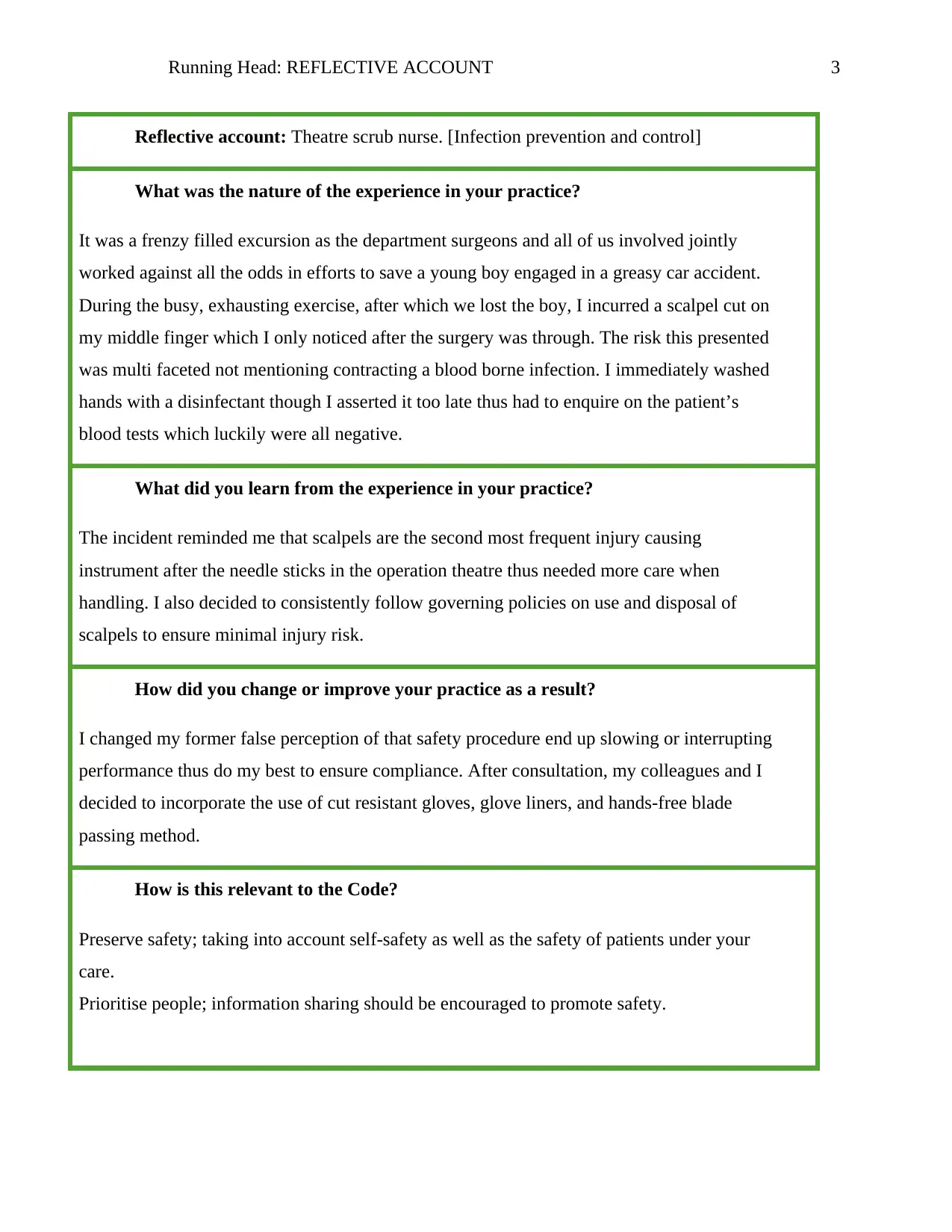
Running Head: REFLECTIVE ACCOUNT 3
Reflective account: Theatre scrub nurse. [Infection prevention and control]
What was the nature of the experience in your practice?
It was a frenzy filled excursion as the department surgeons and all of us involved jointly
worked against all the odds in efforts to save a young boy engaged in a greasy car accident.
During the busy, exhausting exercise, after which we lost the boy, I incurred a scalpel cut on
my middle finger which I only noticed after the surgery was through. The risk this presented
was multi faceted not mentioning contracting a blood borne infection. I immediately washed
hands with a disinfectant though I asserted it too late thus had to enquire on the patient’s
blood tests which luckily were all negative.
What did you learn from the experience in your practice?
The incident reminded me that scalpels are the second most frequent injury causing
instrument after the needle sticks in the operation theatre thus needed more care when
handling. I also decided to consistently follow governing policies on use and disposal of
scalpels to ensure minimal injury risk.
How did you change or improve your practice as a result?
I changed my former false perception of that safety procedure end up slowing or interrupting
performance thus do my best to ensure compliance. After consultation, my colleagues and I
decided to incorporate the use of cut resistant gloves, glove liners, and hands-free blade
passing method.
How is this relevant to the Code?
Preserve safety; taking into account self-safety as well as the safety of patients under your
care.
Prioritise people; information sharing should be encouraged to promote safety.
Reflective account: Theatre scrub nurse. [Infection prevention and control]
What was the nature of the experience in your practice?
It was a frenzy filled excursion as the department surgeons and all of us involved jointly
worked against all the odds in efforts to save a young boy engaged in a greasy car accident.
During the busy, exhausting exercise, after which we lost the boy, I incurred a scalpel cut on
my middle finger which I only noticed after the surgery was through. The risk this presented
was multi faceted not mentioning contracting a blood borne infection. I immediately washed
hands with a disinfectant though I asserted it too late thus had to enquire on the patient’s
blood tests which luckily were all negative.
What did you learn from the experience in your practice?
The incident reminded me that scalpels are the second most frequent injury causing
instrument after the needle sticks in the operation theatre thus needed more care when
handling. I also decided to consistently follow governing policies on use and disposal of
scalpels to ensure minimal injury risk.
How did you change or improve your practice as a result?
I changed my former false perception of that safety procedure end up slowing or interrupting
performance thus do my best to ensure compliance. After consultation, my colleagues and I
decided to incorporate the use of cut resistant gloves, glove liners, and hands-free blade
passing method.
How is this relevant to the Code?
Preserve safety; taking into account self-safety as well as the safety of patients under your
care.
Prioritise people; information sharing should be encouraged to promote safety.
⊘ This is a preview!⊘
Do you want full access?
Subscribe today to unlock all pages.

Trusted by 1+ million students worldwide
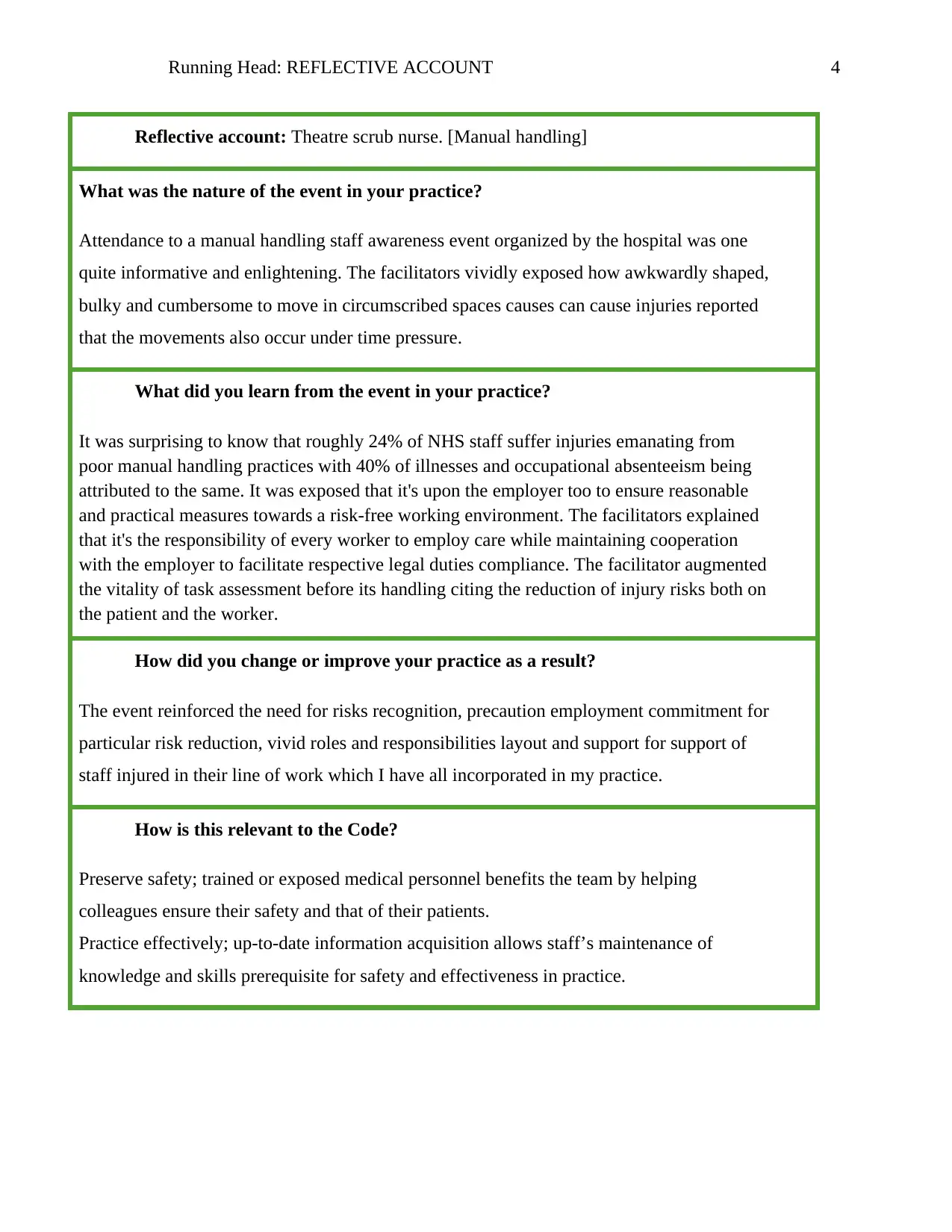
Running Head: REFLECTIVE ACCOUNT 4
Reflective account: Theatre scrub nurse. [Manual handling]
What was the nature of the event in your practice?
Attendance to a manual handling staff awareness event organized by the hospital was one
quite informative and enlightening. The facilitators vividly exposed how awkwardly shaped,
bulky and cumbersome to move in circumscribed spaces causes can cause injuries reported
that the movements also occur under time pressure.
What did you learn from the event in your practice?
It was surprising to know that roughly 24% of NHS staff suffer injuries emanating from
poor manual handling practices with 40% of illnesses and occupational absenteeism being
attributed to the same. It was exposed that it's upon the employer too to ensure reasonable
and practical measures towards a risk-free working environment. The facilitators explained
that it's the responsibility of every worker to employ care while maintaining cooperation
with the employer to facilitate respective legal duties compliance. The facilitator augmented
the vitality of task assessment before its handling citing the reduction of injury risks both on
the patient and the worker.
How did you change or improve your practice as a result?
The event reinforced the need for risks recognition, precaution employment commitment for
particular risk reduction, vivid roles and responsibilities layout and support for support of
staff injured in their line of work which I have all incorporated in my practice.
How is this relevant to the Code?
Preserve safety; trained or exposed medical personnel benefits the team by helping
colleagues ensure their safety and that of their patients.
Practice effectively; up-to-date information acquisition allows staff’s maintenance of
knowledge and skills prerequisite for safety and effectiveness in practice.
Reflective account: Theatre scrub nurse. [Manual handling]
What was the nature of the event in your practice?
Attendance to a manual handling staff awareness event organized by the hospital was one
quite informative and enlightening. The facilitators vividly exposed how awkwardly shaped,
bulky and cumbersome to move in circumscribed spaces causes can cause injuries reported
that the movements also occur under time pressure.
What did you learn from the event in your practice?
It was surprising to know that roughly 24% of NHS staff suffer injuries emanating from
poor manual handling practices with 40% of illnesses and occupational absenteeism being
attributed to the same. It was exposed that it's upon the employer too to ensure reasonable
and practical measures towards a risk-free working environment. The facilitators explained
that it's the responsibility of every worker to employ care while maintaining cooperation
with the employer to facilitate respective legal duties compliance. The facilitator augmented
the vitality of task assessment before its handling citing the reduction of injury risks both on
the patient and the worker.
How did you change or improve your practice as a result?
The event reinforced the need for risks recognition, precaution employment commitment for
particular risk reduction, vivid roles and responsibilities layout and support for support of
staff injured in their line of work which I have all incorporated in my practice.
How is this relevant to the Code?
Preserve safety; trained or exposed medical personnel benefits the team by helping
colleagues ensure their safety and that of their patients.
Practice effectively; up-to-date information acquisition allows staff’s maintenance of
knowledge and skills prerequisite for safety and effectiveness in practice.
Paraphrase This Document
Need a fresh take? Get an instant paraphrase of this document with our AI Paraphraser
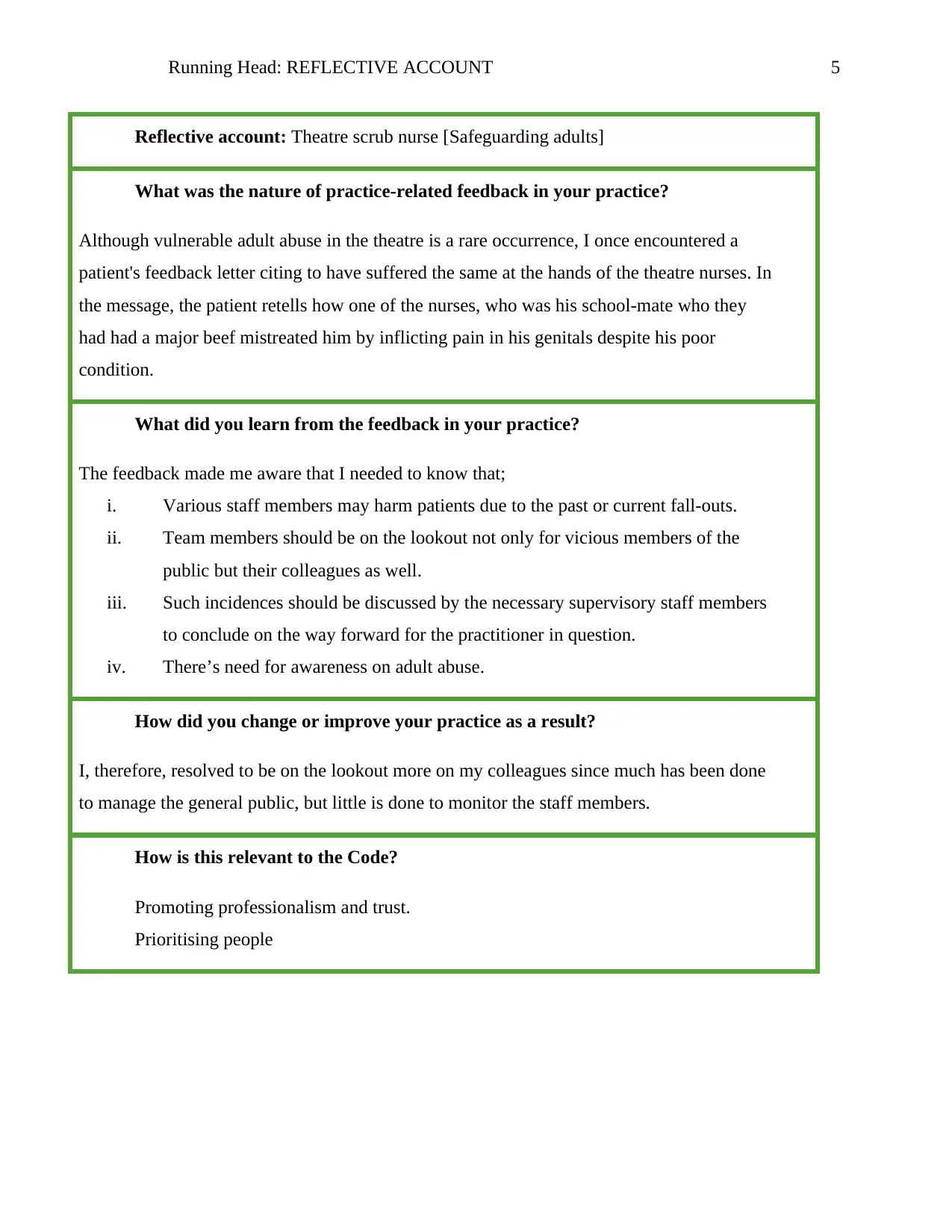
Running Head: REFLECTIVE ACCOUNT 5
Reflective account: Theatre scrub nurse [Safeguarding adults]
What was the nature of practice-related feedback in your practice?
Although vulnerable adult abuse in the theatre is a rare occurrence, I once encountered a
patient's feedback letter citing to have suffered the same at the hands of the theatre nurses. In
the message, the patient retells how one of the nurses, who was his school-mate who they
had had a major beef mistreated him by inflicting pain in his genitals despite his poor
condition.
What did you learn from the feedback in your practice?
The feedback made me aware that I needed to know that;
i. Various staff members may harm patients due to the past or current fall-outs.
ii. Team members should be on the lookout not only for vicious members of the
public but their colleagues as well.
iii. Such incidences should be discussed by the necessary supervisory staff members
to conclude on the way forward for the practitioner in question.
iv. There’s need for awareness on adult abuse.
How did you change or improve your practice as a result?
I, therefore, resolved to be on the lookout more on my colleagues since much has been done
to manage the general public, but little is done to monitor the staff members.
How is this relevant to the Code?
Promoting professionalism and trust.
Prioritising people
Reflective account: Theatre scrub nurse [Safeguarding adults]
What was the nature of practice-related feedback in your practice?
Although vulnerable adult abuse in the theatre is a rare occurrence, I once encountered a
patient's feedback letter citing to have suffered the same at the hands of the theatre nurses. In
the message, the patient retells how one of the nurses, who was his school-mate who they
had had a major beef mistreated him by inflicting pain in his genitals despite his poor
condition.
What did you learn from the feedback in your practice?
The feedback made me aware that I needed to know that;
i. Various staff members may harm patients due to the past or current fall-outs.
ii. Team members should be on the lookout not only for vicious members of the
public but their colleagues as well.
iii. Such incidences should be discussed by the necessary supervisory staff members
to conclude on the way forward for the practitioner in question.
iv. There’s need for awareness on adult abuse.
How did you change or improve your practice as a result?
I, therefore, resolved to be on the lookout more on my colleagues since much has been done
to manage the general public, but little is done to monitor the staff members.
How is this relevant to the Code?
Promoting professionalism and trust.
Prioritising people
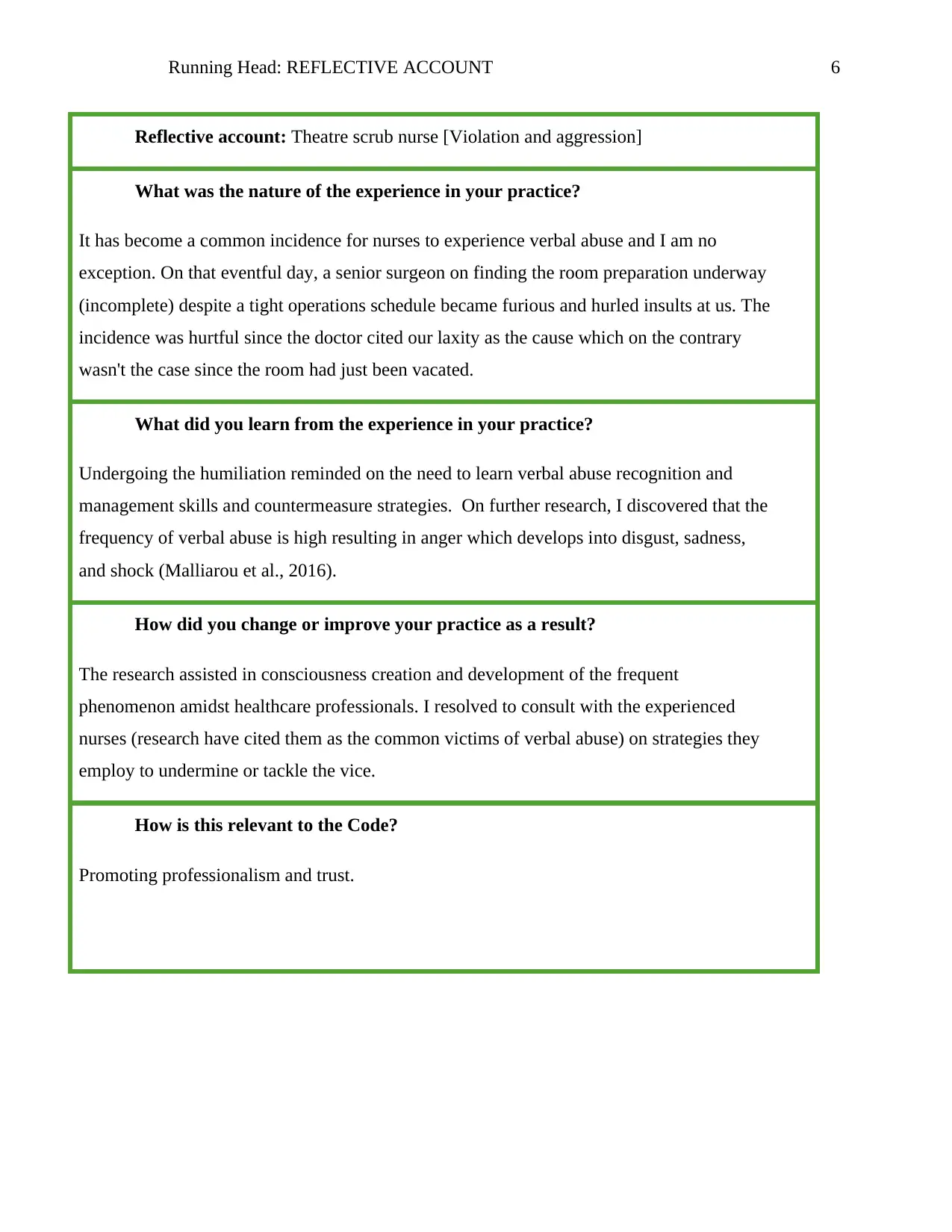
Running Head: REFLECTIVE ACCOUNT 6
Reflective account: Theatre scrub nurse [Violation and aggression]
What was the nature of the experience in your practice?
It has become a common incidence for nurses to experience verbal abuse and I am no
exception. On that eventful day, a senior surgeon on finding the room preparation underway
(incomplete) despite a tight operations schedule became furious and hurled insults at us. The
incidence was hurtful since the doctor cited our laxity as the cause which on the contrary
wasn't the case since the room had just been vacated.
What did you learn from the experience in your practice?
Undergoing the humiliation reminded on the need to learn verbal abuse recognition and
management skills and countermeasure strategies. On further research, I discovered that the
frequency of verbal abuse is high resulting in anger which develops into disgust, sadness,
and shock (Malliarou et al., 2016).
How did you change or improve your practice as a result?
The research assisted in consciousness creation and development of the frequent
phenomenon amidst healthcare professionals. I resolved to consult with the experienced
nurses (research have cited them as the common victims of verbal abuse) on strategies they
employ to undermine or tackle the vice.
How is this relevant to the Code?
Promoting professionalism and trust.
Reflective account: Theatre scrub nurse [Violation and aggression]
What was the nature of the experience in your practice?
It has become a common incidence for nurses to experience verbal abuse and I am no
exception. On that eventful day, a senior surgeon on finding the room preparation underway
(incomplete) despite a tight operations schedule became furious and hurled insults at us. The
incidence was hurtful since the doctor cited our laxity as the cause which on the contrary
wasn't the case since the room had just been vacated.
What did you learn from the experience in your practice?
Undergoing the humiliation reminded on the need to learn verbal abuse recognition and
management skills and countermeasure strategies. On further research, I discovered that the
frequency of verbal abuse is high resulting in anger which develops into disgust, sadness,
and shock (Malliarou et al., 2016).
How did you change or improve your practice as a result?
The research assisted in consciousness creation and development of the frequent
phenomenon amidst healthcare professionals. I resolved to consult with the experienced
nurses (research have cited them as the common victims of verbal abuse) on strategies they
employ to undermine or tackle the vice.
How is this relevant to the Code?
Promoting professionalism and trust.
⊘ This is a preview!⊘
Do you want full access?
Subscribe today to unlock all pages.

Trusted by 1+ million students worldwide
1 out of 6
Related Documents
Your All-in-One AI-Powered Toolkit for Academic Success.
+13062052269
info@desklib.com
Available 24*7 on WhatsApp / Email
![[object Object]](/_next/static/media/star-bottom.7253800d.svg)
Unlock your academic potential
Copyright © 2020–2026 A2Z Services. All Rights Reserved. Developed and managed by ZUCOL.





